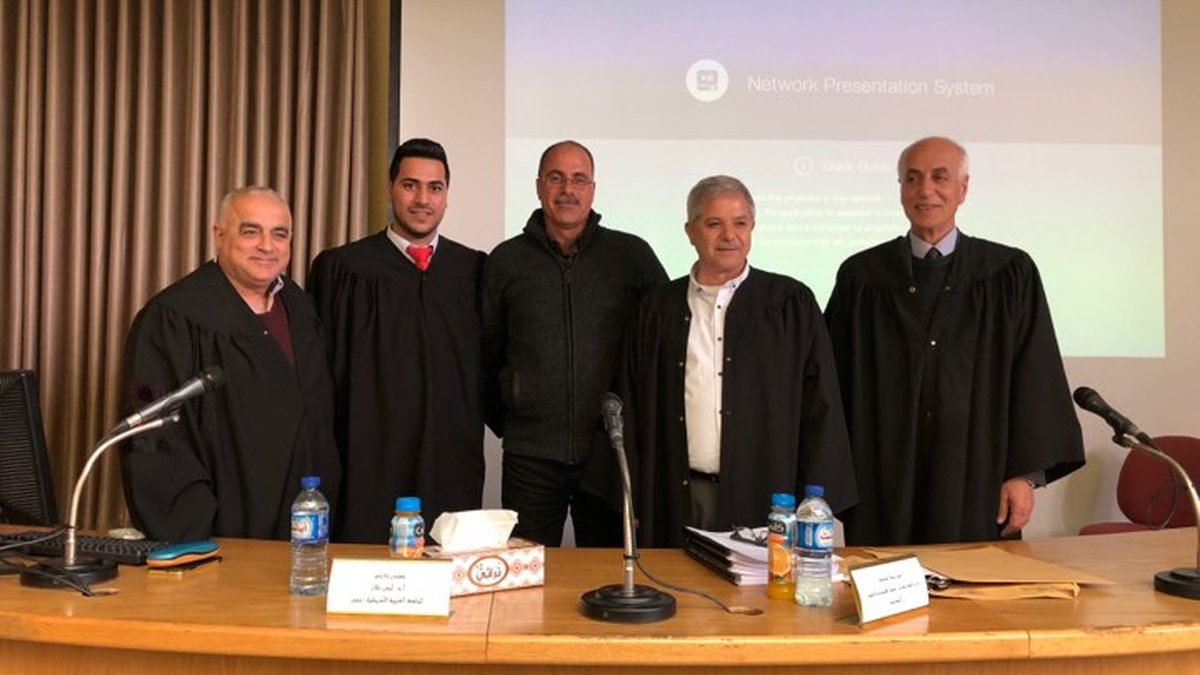
The Faculty of Graduate Studies awarded the researcher AbdulRahman Darweesh a Master’s Degree in Planning & Political Development in response to his thesis entitled “The Role of High Follow-Up Committee for Arabic Citizen in Preserving National Identity of the Palestinians in 1948 Land”.
This research aims to investigate the role of the High Follow-Up Committee for Arab Citizens in preserving national identity of the Palestinians in 1948 lands.
The problem of the study is summarized in the form of an answer to the research question: To what extent the role of the higher monitoring committee of the Arab public in preserving the Palestinian National Identity and enhancing the belonging of the Palestinians of 1948 have been successful?
The study consisted of five chapters, the first chapter dealt with the problem of the study, importance of the study, methodology and literature review.
The second chapter dealt with the concept of national identity in general and stages of forming the Palestinian national identity.
Chapter Three dealt with the Higher Follow-up Committee of the Arab masses, through the recognition of their origins, objectives, achievements and challenges faced.
In Chapter Four, the role of the Higher Follow-up Committee in preserving the national identity of the Palestinians was discussed. Through the strategy of the Higher Follow-up Committee for the Preservation of Palestinian Identity, the challenges facing the role of the Committee .
The last chapter dealt with the main findings and recommendations of the study.
The most important findings of the study:
1. The Higher Follow-up Committee was established in 1982 as a representative framework that includes the Arab-Palestinian political spectrum in Israel. The Follow-up Committee was established to build a collective framework that brings all political forces together,
2. The main objective of forming the Higher Follow-up Committee is to reflect on the idea of unity on a national basis among all components of the political community
3. The Higher Follow-up Committee is working in many fields during the recent period, which is represented by supporting national issues such as the Land Day, the Nakba and others
4. The challenges facing the Higher Follow-up Committee are numerous, which causes a difficulty in dealing with Israeli practices and prompts the committee to work on developing the idea of resistance and refusing to confiscate.
Based on the research findings, the researcher define set of recommendations, most notably are mentioned below:
1. The necessity of increasing relations between the High Follow-up Committee and the Arab community in the occupied territories by increasing its activities and actions which reflects the role and importance of Palestinian citizens which sheds the lights on their support.
2. Develop a comprehensive plan of action that includes all the main points which the follow-up committee should take into consideration by developing a new and modern work strategy in each period to be able to deal with emergency situations in the Palestinian street.
3. Communicate with the various Palestinian, Arab and regional bodies to obtain the appropriate financial support that allows them to carry out their activities and activities in promoting the Palestinian national identity.
The committee consisted of: Dr. Ibrahim Abu Jaber as a main supervisor and Chairman, Prof. Ayman Yousf as an external examiner and Dr. Nayef Abu Khalaf as an internal examiner.
At the end of the session, the committee approved the success of the researcher and recommended him a Master’s degree.
عدد القراءات: 242





